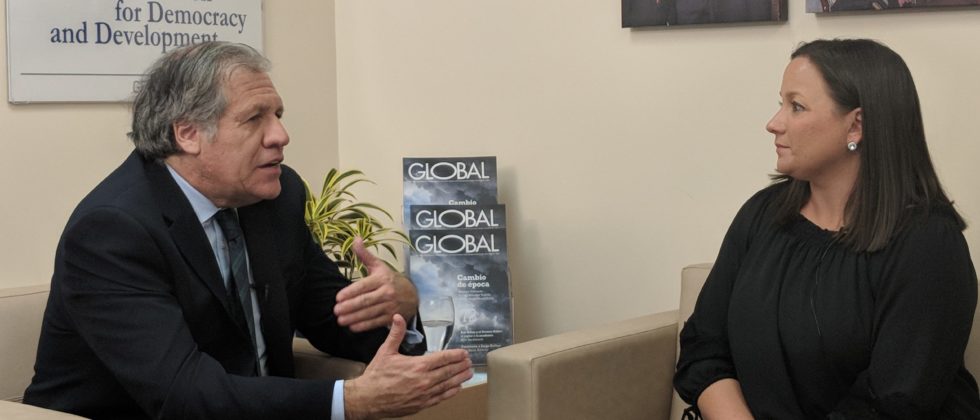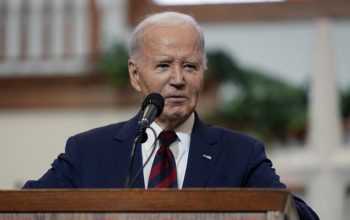news
GFDD Interviews Secretary General of the Organization of American States, Luis Almagro Lemes, at its April Global Roundtable
April 19, 2018
In the most recent edition of the GFDD Global Roundtables, Maria Victoria Abreu, GFDD’s International Affairs and Socio-Economic Development Program Manager, interviews Luis Almagro Lemes, Secretary General of the Organization of American States (OAS), at the GFDD offices in Washington, DC. Among many other topics, the two spoke about the role of the OAS in the regional democratic processes including the electoral observation missions, the new institutional challenges for the OAS, and the upcoming General Assembly to be held in the Nation’s capital in June 2018.
When asked about the phrase that has defined his mandate at the OAS, “more rights for more people,” Almagro noted that this is an important approach as Latin America and the Caribbean is the most unequal continent of the world and for that reason its citizens don’t have the same opportunities to access their rights. “The OAS wants to be closer to the citizens and promote policies that put them closer to their rights”.
The consolidation of democracy in the Hemisphere is one of the OAS’s main areas of interest and Almagro was generous in explaining how the organization is achieving that goal, although many of the difficulties have existed for more than 200 years. He also laid out the region’s most important challenges, including eliminating corruption and using more and better technologies to empower its citizens
Finally, Secretary Almagro said that the upcoming General Assembly of the OAS, while following the accustomed agenda for this prestigious event, will also be strongly influenced by the regional political landscape of the moment, including the presidential elections happening in several Latin American countries this year.
About Secretary General Luis Almagro Lemes
Luis Almagro Lemes was elected Secretary General of the Organization of American States on March 18, 2015. Upon taking leadership of the OAS, he announced that one of the central themes of his mandate will be “more rights for more people,” and that he would work to bring the Organization closer to the new realities in the Hemisphere and contribute to ensuring more democracy, security and prosperity for all. A lawyer and career diplomat, Almagro was Foreign Minister of Uruguay from 2010 to March 1, 2015 and has extensive regional and international experience. He was elected Senator in the national elections in Uruguay in October 2014. His time at the head of Uruguayan diplomacy was characterized by activism in defense of human and civil rights at the regional and global level, the insertion of Uruguay into non-traditional markets, the diversification of these markets, and the strengthening of the image of Uruguay as a democratic, fair, tolerant, and diverse society, with ever increasing rights for more Uruguayans. As Foreign Minister for President José Mujica, he defined several emblematic initiatives that put the small South American country on the global map, from receiving former prisoners from Guantanamo, to welcoming dozens of Syrian families who had been victims of the country´s conflict, to building support in the United Nations so that, beginning in 2016, Uruguay will become part of the Security Council. Moreover, Uruguay has maintained its presence in Haiti to ensure the continuity of the process of reconstruction in the country following the devastating earthquake of 2010. Knowledgeable about the new regional alignments, Almagro was an active participant in the consolidation of UNASUR and CELAC and as member of the special UNASUR delegation to Venezuela in 2014 he was recognized as an advocate of dialogue between the government and the opposition to stop the violence at that moment. As a consensus builder in the region and at the same time a driver of new initiatives, during his term at the head of the country´s diplomacy, he achieved the long-desired entry of citrus products into the United States, a key market for the sector, while moving forward with bilateral cooperation programs in areas of scientific-technical innovation. For its part, Uruguay developed specific programs of cooperation for development with Bolivia, Paraguay, and several African nations in the context of the vision of international solidarity that characterized the term of the former Foreign Minister. In 2014 Foreign Policy magazine named him a Leading Global Thinker, one of ten decision-makers in the world who have been granted this international distinction.
More information about GFDD Global Roundtables:
http://gfddglobalroundtable.org















